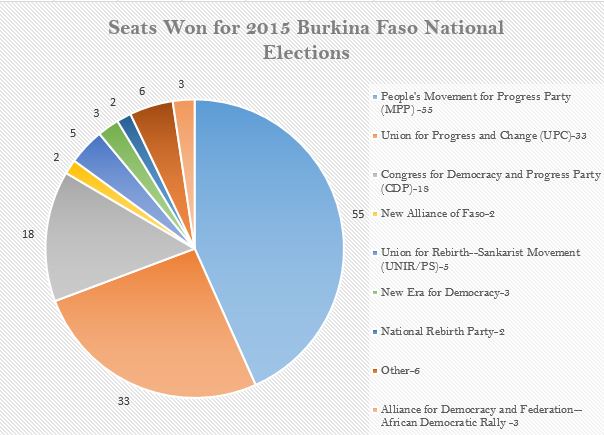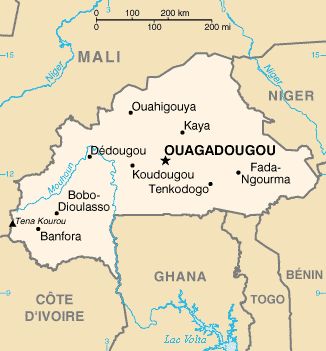|
1965 Upper Voltan Presidential Election
Presidential elections were held for the first time in the Republic of Upper Volta on 3 October 1965, as previously the President had been appointed by the National Assembly. At the time, the country was a one-party state, with the Voltaic Democratic Union–African Democratic Rally (UDV–RDA) as the sole legal party. Its leader, Maurice Yaméogo, was the only candidate, and was re-elected with 100% of the vote. Voter turnout was 98.4%.Dieter Nohlen, Michael Krennerich & Bernhard Thibaut (1999) ''Elections in Africa: A data handbook'', p145 Results References {{Burkinabe elections Presidential elections in Burkina Faso Upper Volta Upper Volta (now named Burkina Faso Burkina Faso (, ; , ff, 𞤄𞤵𞤪𞤳𞤭𞤲𞤢 𞤊𞤢𞤧𞤮, italic=no) is a landlocked country in West Africa with an area of , bordered by Mali to the northwest, Niger to the northeast, Benin to ... Presidential election One-party elections Single-candidate elections ... [...More Info...] [...Related Items...] OR: [Wikipedia] [Google] [Baidu] |
Republic Of Upper Volta
The Republic of Upper Volta (french: République de Haute-Volta) was a landlocked West African country established on 11 December 1958 as a self-governing colony within the French Community. Before becoming autonomous, it had been part of the French Union as the French Upper Volta. On 5 August 1960, it gained full independence from France. On 4 August 1984, it changed its name to Burkina Faso. Etymology The name Upper Volta indicated that the country contains the upper part of the Volta River. History Upper Volta obtained independence on 5 August 1960, with Maurice Yaméogo of the Voltaic Democratic Union-African Democratic Rally (UDV-RDA) becoming the country's first president. A constitution was ratified the same year, establishing presidential elections by direct universal suffrage and a National Assembly with five-year terms. Shortly after coming to power, Yaméogo banned all political parties other than the UDV-RDA. He had shown a deep authoritarian streak eve ... [...More Info...] [...Related Items...] OR: [Wikipedia] [Google] [Baidu] |
National Assembly Of Burkina Faso
The unicameral National Assembly is Burkina Faso's legislative body. In 1995, it became the lower house of a bicameral Parliament, but the upper house ( Chamber of Representatives) was abolished in 2002. The upper house was to have been restored under the name "Senate" in the June 2012 constitutional amendments. This revision was never executed due to an extended and unresolved political confrontation over the Senate's establishment, which left the country effectively with a unicameral legislature as of the October 2014 constitutional crisis. On 30 October 2014, as part of the 2014 Burkinabé uprising, protesters stormed the parliament building and set fire to it, in anger at the Parliament's decision to amend the Constitution of Burkina Faso to abolish term limits, which would have effectively paved the way for President Blaise Compaoré to remain in office for another five-year term. On 24 January 2022, during the January 2022 Burkinabé coup d'état, President Kaboré was ... [...More Info...] [...Related Items...] OR: [Wikipedia] [Google] [Baidu] |
One-party State
A one-party state, single-party state, one-party system, or single-party system is a type of sovereign state in which only one political party has the right to form the government, usually based on the existing constitution. All other parties are either outlawed or allowed to take only a limited and controlled participation in elections. Sometimes the term "''de facto'' one-party state" is used to describe a dominant-party system that, unlike the one-party state, allows (at least nominally) democratic multiparty elections, but the existing practices or balance of political power effectively prevent the opposition from winning power. Although it is predated by the 1714 to 1783 "age of the Whig oligarchy" in Great Britain, the rule of the Committee of Union and Progress (CUP) over the Ottoman Empire following the 1913 coup d'etat is often considered the first one-party state. Concept One-party states justify themselves through various methods. Most often, proponents of a on ... [...More Info...] [...Related Items...] OR: [Wikipedia] [Google] [Baidu] |
African Democratic Rally (Burkina Faso)
The African Democratic Rally (''Rassemblement Démocratique Africain'') is a political party in Burkina Faso. It was originally known as the Voltaic Democratic Union-African Democratic Rally (UDV-RDA) and was formed in 1957 as the Voltaic section of the African Democratic Rally (RDA). Soon after Independence in 1960, UDV-RDA became the only legal political party in Upper Volta and a civilian dictatorship was set up. In 1966, there was a military coup to overthrow the government, and the UDV-RDA didn't exist in the new government. Under the rule of Sangoulé Lamizana UDV-RDA was reconstructed and developed good relations with the government. The relation to Lamizana did however cause internal dissent. The pro-Lamizana faction was led by Prime Minister Joseph Conombo and the anti-Lamizana faction was led by Joseph Ouédrago. At the time of the presidential and legislative elections 1978 UDV-RDA had one list for legislative but the different factions supported different preside ... [...More Info...] [...Related Items...] OR: [Wikipedia] [Google] [Baidu] |
Maurice Yaméogo
Maurice Yaméogo (31 December 1921 – 15 September 1993) was the first President of the Republic of Upper Volta, now called Burkina Faso, from 1959 until 1966. "Monsieur Maurice" embodied the Voltaic state at the moment of independence. However, his political ascension did not occur without difficulties. As a member of the colonial administration from 1946, Maurice Yaméogo found a place for himself in the busy political landscape of Upper Volta thanks to his skill as a speaker. In May 1957, during the formation of the first Upper Voltaic government instituted under the Loi Cadre Defferre, he joined the coalition government formed by Ouezzin Coulibaly, as minister for agriculture and a member of the Voltaic Democratic Movement (MDV). In January 1958, threatened by a vote of censure, Coulibaly enticed Maurice Yaméogo and his allies in the assembly to join the Voltaic Democratic Union-African Democratic Assembly (UDV-RDA) in exchange for promises of promotion within the governme ... [...More Info...] [...Related Items...] OR: [Wikipedia] [Google] [Baidu] |
Dieter Nohlen
Dieter Nohlen (born 6 November 1939) is a German academic and political scientist. He currently holds the position of Emeritus Professor of Political Science in the Faculty of Economic and Social Sciences of the University of Heidelberg. An expert on electoral systems and political development, he has published several books. IDEA Bibliography Books published by Nohlen include: *''Electoral systems of the world'' (in German, 1978) *''Lexicon of politics'' (seven volumes) *''Elections and Electoral Systems'' (1996) *''Elections in Africa: A Data Handbook'' (1999 with Michael Krennerich and Bernhard Thibaut) *''Elections in Asia and the Pacific: A Data Handbook'' (2001 with and Christof Hartmann) ** ''Volume 2: South East Asia, East Asia, and the Pacific'' (2002), *''Vo ...[...More Info...] [...Related Items...] OR: [Wikipedia] [Google] [Baidu] |
Dolf Sternberger
Dolf Sternberger (originally ''Adolf Sternberger''; 28 July 1907 in Wiesbaden Wiesbaden () is a city in central western Germany and the capital of the state of Hesse. , it had 290,955 inhabitants, plus approximately 21,000 United States citizens (mostly associated with the United States Army). The Wiesbaden urban area ... – 27 July 1989 in Frankfurt/Main) was a German philosopher and political scientist at the University of Heidelberg. Dolf Sternberger is known for his concept of citizenship in contemporary German political thought, and for coining the term " constitutional patriotism" (''Verfassungspatriotismus'') in 1979, on the occasion of the 30th anniversary of the Federal Republic of Germany.Jan-Werner Muller''Constitutional Patriotism'' Princeton University Press, 2008, p. 21. Notes References * Bernhard Vogel: ''Dolf Sternberger und die Politische Wissenschaft''. Heidelberg 2008. External links * "Sprachkritik", Nazism, and the German Conscience: the ... [...More Info...] [...Related Items...] OR: [Wikipedia] [Google] [Baidu] |
Bernhard Vogel (politician)
Bernhard Vogel (; born 19 December 1932) is a German politician of the Christian Democratic Union (CDU). He was the 4th Minister President of Rhineland-Palatinate from 1976 to 1988 and the 2nd Minister President of Thuringia from 1992 to 2003. He is the only person to have been head of two different German federal states and is the longest-governing Minister President of Germany. He served as the 28th and 40th President of the Bundesrat in 1976/77 and 1987/88. Early life and education Vogel was born in Göttingen. He received his ''Abitur'' in Munich in 1953, and began studies in political science, history, sociology, and economics, first in Heidelberg and then in Munich. He received his doctorate in 1960, while working as a research assistant at the Institute of Political Science at the University of Heidelberg. He became a lecturer there the following year, also working in adult education. Political career In 1963, Vogel was elected to the municipal council of Heidelbe ... [...More Info...] [...Related Items...] OR: [Wikipedia] [Google] [Baidu] |
Presidential Elections In Burkina Faso
President most commonly refers to: * President (corporate title) * President (education), a leader of a college or university *President (government title) President may also refer to: Automobiles * Nissan President, a 1966–2010 Japanese full-size sedan * Studebaker President, a 1926–1942 American full-size sedan * VinFast President, a 2020–present Vietnamese mid-size SUV Film and television *''Præsidenten'', a 1919 Danish silent film directed by Carl Theodor Dreyer * ''The President'' (1928 film), a German silent drama * ''President'' (1937 film), an Indian film * ''The President'' (1961 film) * ''The Presidents'' (film), a 2005 documentary * ''The President'' (2014 film) * ''The President'' (South Korean TV series), a 2010 South Korean television series * ''The President'' (Palestinian TV series), a 2013 Palestinian reality television show *'' The President Show'', a 2017 Comedy Central political satirical parody sitcom Music * The Presidents (American soul band) ... [...More Info...] [...Related Items...] OR: [Wikipedia] [Google] [Baidu] |
1965 Elections In Africa
Events January–February * January 14 – The Prime Minister of Northern Ireland and the Taoiseach of the Republic of Ireland meet for the first time in 43 years. * January 20 ** Lyndon B. Johnson is sworn in for a full term as President of the United States. ** Indonesian President Sukarno announces the withdrawal of the Indonesian government from the United Nations. * January 30 – The state funeral of Sir Winston Churchill takes place in London with the largest assembly of dignitaries in the world until the 2005 funeral of Pope John Paul II. * February 4 – Trofim Lysenko is removed from his post as director of the Institute of Genetics at the Academy of Sciences in the Soviet Union. Lysenkoist theories are now treated as pseudoscience. * February 12 ** The African and Malagasy Common Organization ('; OCAM) is formed as successor to the Afro-Malagasy Union for Economic Cooperation ('; UAMCE), formerly the African and Malagasy Union ('; UAM). * F ... [...More Info...] [...Related Items...] OR: [Wikipedia] [Google] [Baidu] |
One-party Elections
A government is the system or group of people governing an organized community, generally a State (polity), state. In the case of its broad associative definition, government normally consists of legislature, Executive (government), executive, and judiciary. Government is a means by which organizational policies are enforced, as well as a mechanism for determining policy. In many countries, the government has a kind of constitution, a statement of its governing principles and philosophy. While all types of organizations have governance, the term ''government'' is often used more specifically to refer to the approximately 200 List of sovereign states, independent national governments and Governmental organization, subsidiary organizations. The major types of political systems in the modern era are democracies, monarchies, and authoritarian and totalitarian regimes. Historically prevalent forms of government include monarchy, aristocracy, timocracy, oligarchy, democracy ... [...More Info...] [...Related Items...] OR: [Wikipedia] [Google] [Baidu] |



